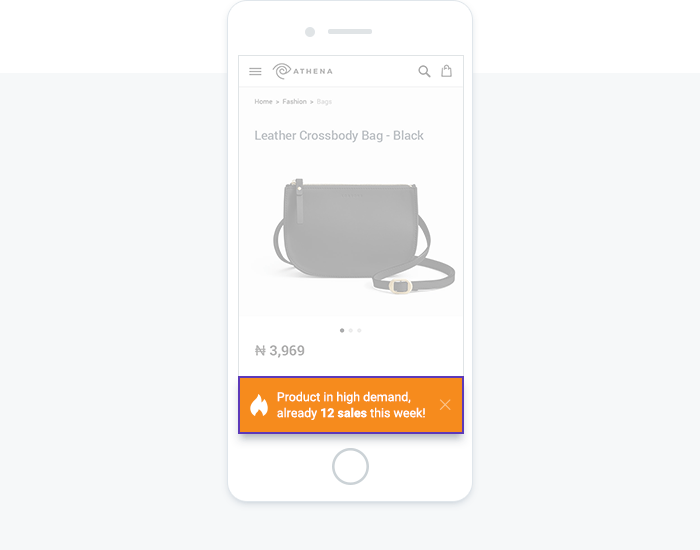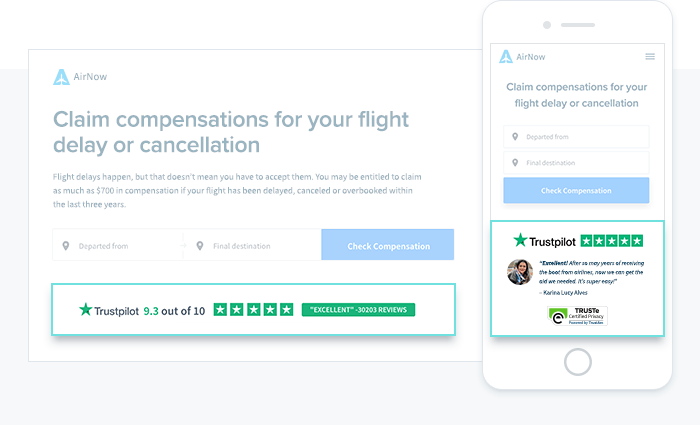Social Proof serves a digital online business or brand message-based word of mouth that allows target audiences and potential customers to learn from the experience of others. Ultimately, the process helps them make purchasing decisions or convinces them to buy products and services based on what others have to say. Realistically, social proof isn’t new — it’s a dynamic approach.
However, most Internet consumers are becoming increasingly distrustful of brands. Instead of listening to what companies have to say about themselves, consumers want to know about other individuals who are just like them. On the one hand, in terms of everyday life, most people might choose a restaurant based on positive reviews or follow a trend because they see others doing it.
People often look to others for guidance, especially when faced with ambiguity or uncertainty. Seeing others engaging in a certain behavior can signal that it’s the “right” or “safe” thing to do. On the other hand, in terms of digital online marketing, businesses use testimonials, reviews, and social media engagement metrics (likes, shares, followers) to demonstrate popularity and build trust.
Generally, Social Proof motivates your customers to take action, making it an essential marketing tool for social media channels when creating content or when utilized on a website. For example, instead of trying products in-store, online customers can only get a feel for products based on photographs and reviews from other people with much more satisfaction than the horse’s mouth.
What Social Proof Entails In The Digital Online Landscapes
Social Proof is a psychological phenomenon where people are influenced by the actions and opinions of others, often copying their behavior in uncertain situations to feel more confident or secure. Also known as informational social influence, Social Proof is the tendency for individuals to validate their existing actions, attitudes, or beliefs by observing and mimicking the behavior of others.
In essence, it’s the notion that, since others are doing it, I should be doing it, too. Social proof is especially prominent in situations where people are unable to determine the appropriate mode of behavior and is driven by the assumption that surrounding people possess more knowledge about the situation. Also referred to as “herd mentality,” social proof is an ever-evolving phenomenon.
It’s a time when decision-making becomes credible and validated by the behavior of others. It’s the reason we ask for second opinions, assume nightclubs with long lines must be great, and the driving force behind displaying product reviews and customer testimonials. In the online digital marketing realm, it means that people are more likely to read your blogs and tweet your content.
They are also likely to share a link to your website if they see that others have already done these things. In other words, there’s an energy conservation initiative going on in your community urging citizens to use fans instead of air conditioning. 4 signs have been randomly divided amongst hundreds of houses throughout your neighborhood, each containing a convincing message.
Consider the following:
- You could save $54 a month on your utility bill.
- You could prevent the release of 262 pounds of greenhouse gases per month.
- Conserving energy is the socially responsible thing to do.
- 77% of your neighbors use fans instead of air conditioning— it’s your community’s popular choice.
So, which sign do you think would most effectively persuade people not to use the air conditioning? If you answered #4, you’re correct and for good reason. This situation was an actual scientific study that demonstrates the impact group influence has on decision making. The first 3 reasons, while all valid in their own right, all fell short in the face of one simple yet powerful notion.
In this case, the notion is that ”since others are doing it, I should be doing it, too.” Psychologists call this phenomenon social proof, and it’s especially prevalent in the realm of online shopping. These days, eCommerce brands are utilizing the ‘pull of the crowd’ to influence purchasing decisions and turn hesitant visitors into confident purchasers. Let’s see some social proof strategies.
How To Use Social Proof In Empowering Brand Presence Growth
While you should never rely too heavily on social proof and should continue to focus on how you can provide value to your customers, this part of your digital marketing strategy can help your customers take action. Social proof provides a resource for customers to learn about your brand, products, and services. It can also improve your SEO rankings in a way.
In particular, by building trust between your business and its customers while enhancing your social media marketing (SMM) strategy as well. In addition, social proof can be shared across all platforms to help you better communicate your value to customers based on what past customers have to say. So, what are the best ways to use social proof effectively?
Well, there are many ways to use social proof to improve your marketing efforts. Of course, the first step is to gather social proof. If you’re using a website builder, you may be able to use integrations with email marketing and other review-gathering tools to automatically post reviews from customers online. Below are a few ways to use social proof in marketing.
1. Use Channel-Specific Social Media
Social proof gives you additional content to use on your social media channels, but you’ll need to consider only those that are the best performing. Instead of posting sales content every day that doesn’t get much engagement, just try other means.
Such as posting endorsements from celebrities, influencers, and your customers. In addition, using social proof on social media can foster trust. You can also repost any social proof on your social profiles. This includes but is not limited to brand mentions in publications, shout-outs from celebrities, and reviews from people who have used your product or services.
2. Consider An In-Ads Campaign Plan
If you spend money on paid digital advertising, consider adding social proof to promote trust with your customers. Crowd-based social proof that celebrates the number of good reviews your brand has can help you attract more customers because it demonstrates the value of your products and services.
You can highlight five-star reviews and the number of reviews as a quick and easy way to build trust with your ads rather than making the ads all about your business and not about the customers.
3. Utilize Your Brand Website Fully
Every website, no matter what industry you’re in, whether you sell mattresses or hiking apparel, can benefit from social proof in the form of testimonials. Testimonials are powerful tools to help your customers make decisions about your brand or business. They can be reassuring for prospective customers who are on the fence about whether to make the final decision.
Especially a decision to spend their money on your products and mobile app services among other solutions or not. When sharing customer testimonials, try to make them as relevant as possible. For example, you can share testimonials and reviews on product pages for specific products rather than general statements about the brand.
4. Feature A Few Customer Testimonials
You can also feature testimonials at the bottom of your home page to show brand authenticity and convince prospective customers to continue browsing the website. Depending on the nature of your business, you might choose to highlight professional testimonials. For example, let’s say that you run a marketing agency, you should include testimonials in a pronto.
In particular, high-ranking executive titles help convince your target audience of executives to take action on your website. You can also highlight any earned media you’ve received as a result of your public relations efforts. For example, if your brand has been highlighted in any top-tier publications that your target audience would know.
Eventually, this can greatly help boost your authority and credibility in the industry. Additionally, you can highlight celebrity endorsements or expert approvals. For example, an athletics company may receive endorsements from a pro athlete, while a makeup brand may receive expert approval from dermatologists.
5. Share Your Milestones By Email
Basically, email marketing is usually a very great way to keep customers coming back for more. However, instead of blasting your subscribers with sales, you can share company milestones to build trust among customers who haven’t made a purchase yet and are unsure whether or not to trust your brand.
With email marketing, you can share company milestones that may include how many happy customers you have, which products are the top-rated, and if you’ve been mentioned in any popular publications.
6. Encourage Other Readers To Do Reviews
A business with reviews online can build trust with customers, so it’s good practice to get as many reviews as possible to share with your audience and help improve your brand. Using previous reviews from customers can help encourage others to leave reviews. For example, you can send out an email marketing campaign that highlights a customer review.
Then again, ask what individuals who haven’t left reviews thought of your products and services. Of course, you may need to entice individuals to take time out of their day to leave you a review, but while you should offer them a deal or discount, you should never bribe them for positive reviews since all of your testimonials should be authentic.
The Most Effective Social Proof Strategies For eCommerce Businesses
While we’d like to think our actions are always determined by our individualistic thinking, the truth is that our final decision-making is often conditioned by those around us. This notion is especially prominent in situations where people are unable to determine the appropriate mode of behavior and is driven by the assumption that surrounding people possess more knowledge about the situation.
Even if a brand’s unique value proposition is perfect, it may not be enough to secure a purchase. In fact, according to a survey conducted by the Expo Team, consumer reviews are trusted nearly 12 times more than descriptions that come from manufacturers. If you’re an eCommerce brand, leveraging social proof in your offering can solidify customer confidence in purchasing decisions.
It can also help eliminate the concerns that stand between them and clicking the buy button. By all means, leveraging social proof remains one of the most effective ways to ease the minds of apprehensive target audiences and potential customers. Be that as it may, you can find more than a hundred personalization examples from real brands in the Inspiration Library to experiment with.
Strategy #1: Highlighting demand to create urgency
Highlighting high customer demand for a product is a proven method of boosting sales and can be accomplished by showcasing the number of views, adds-to-cart, or purchases that were conducted within a specific time frame. Notifying customers that “157 people have bought this product within the last 24 hours,” for example, creates a correlation with urgency.
It also circles the buying mind of the customer and induces a fear of missing out for not going through with the purchase. The understanding that other people have already bought the item plays an important role in validating the customer’s thinking to buy it as well.
Uncertain customers naturally find comfort in a greater collective, and if you can create the impression that everyone is buying your product, there’s a strong likelihood that they will, too.
Strategy #2: Utilizing the principle of community
Humans tend to turn to others when determining courses of action, especially those who come from similar backgrounds or share similar interests. eCommerce brands can leverage this idea by evoking a sense of identity when presenting products to customers. One way to accomplish this is by inserting a product badge or overlay that makes direct reference to a user’s geolocation.
If a customer is from New York, for instance, communicating that an additional “98 visitors are now viewing this item in New York” lends credibility to the product and creates a relatable outlet for the user. Allowing users to ‘feel at home’ when buying is a bonafide way of increasing purchase rates.
Building trust is key to reducing friction and reassuring customers. Surfacing positive customer testimonials in the right context can achieve exactly that.
The Best Internet Proofing Practice For Digital Online Businesses
A popular example where eCommerce businesses utilize the power of social proof is when highlighting high customer demand for a product by showcasing the number of views and adds-to-cart. It also helps track purchases that were conducted within a specific time frame. For example, notifying customers that “157 people have bought this product within the last 24 hours” is invaluable.
This is because it creates a correlation between urgency and buying in the mind of the customer and induces a fear of missing out for not going through with the purchase. In other words, the understanding that other people have already bought the item plays an important role in validating the customer’s thinking to buy it as well. Uncertain customers naturally find comfort in others.
This means entrusting a greater collective — by creating the impression that everyone is buying a product, there’s a strong likelihood that these customers will, too. In today’s increasingly consumer-centric environment, even if a brand’s value proposition is perfect, it may not be enough to secure a purchase. There are some examples of how to use social proof in eCommerce.
Consider the following:
- Highlighting demand to create urgency: If you can create the impression that everyone is buying your product, there’s a strong likelihood that they will too.
- The principle of community: Allowing users to ‘feel at home’ when buying is a bonafide way of increasing purchase rates.
Thus, leveraging the psychological power of social proof and scarcity messaging is the way to go. For eCommerce brands or businesses, utilizing social proof in an offering can solidify customer confidence in purchasing decisions and help eliminate the concerns that stand between them and converting on an offer.
When it comes to introducing social proofing tactics into your marketing, be sure to do A/B Testing on your ideas as you implement them to find the variations that make the most sense for your target audience segments and potential customer demographics. Ongoing optimization can make all the difference when persuading visitors using the power of social proof.
Final Thoughts:
Leveraging Social Proof marketing remains one of the most effective ways to ease the minds of apprehensive customers and successfully influence purchasing decisions. In a reality where presenting a perfect value proposition isn’t always enough, grasping the psychology behind consumer decisions is key to increasing conversion rates, add-to-cart rates, and ultimately driving sales.
As we’ve seen, Social Proof comes in many forms, but you must find the right ways to use social proof in your marketing efforts to build trust and credibility. Whether you have celebrity endorsements, media coverage, or tons of happy customers, you can use this to an advantage — make prospective customers take action on your website or social media channels to grow business.
Of course, to use social proof, you need to have social proof. If you don’t have any reviews yet, entice customers to leave reviews by making it easy for them. You can use your email marketing software or integrate review apps to make collecting and using reviews easier.





